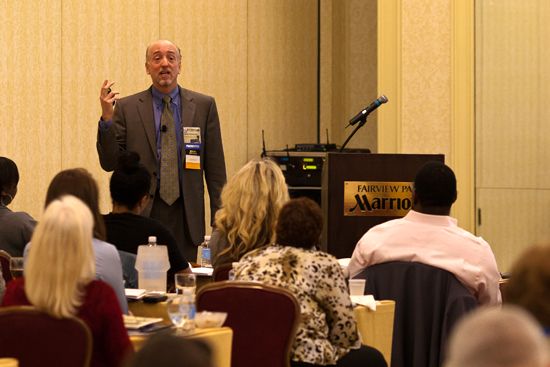
How to Create Great Proposal Themes (Part 5): Who You Gonna Call?
- 1.How to Create Great Proposal Themes
- 2.What’s a Proposal Theme and Why is it Important? (Part 1)
- 3.How to Create Great Proposal Themes (Part 2): Features and Benefits
- 4.How to Create Great Proposal Themes (Part 3): The Proof is in the Pudding
- 5.How to Create Great Proposal Themes (Part 4): A Method for the Madness
- 6.How to Create Great Proposal Themes (Part 5): Who You Gonna Call?
- 7.Telling Your Story: Compliant and Compelling Proposal Themes that Win
Many companies fail to standardize theme development processes or lack the sufficient resources to follow them efficiently and effectively.
Part 5 highlights some of the most common theme development challenges and provides some practical recommendations you can use to create great proposal themes.
This five-part series began with the definition of proposal themes and a description of the benefits of proposal theme development. We looked at the primary components of winning proposal themes (features, benefits, and proof). We described how to get the most out of proposal themes by providing discriminating proof to set you apart from the competition. We tied all the concepts together with a recipe for success—a proven methodology for developing winning proposal themes. It all sounded pretty simple…didn’t it? Then why do many organizations continue to fail to apply these concepts consistently?
Part 5 concludes this series with some common theme development challenges and industry leading resources you can use to help you create great proposal themes.
Theme Development Challenges
Most companies have established proposal processes in place that include some form of proposal theme development. However, many companies fail to either standardize these processes or lack the sufficient resources to follow them efficiently and effectively.
Unless the capture or proposal manager tackles the theme development task alone (not recommended), some type of working sessions are required: 1) To identify the requisite feature, benefit, and proof point input, and; 2) To develop standardized theme statements and supporting proof point focus boxes from this input. But getting the right people in the same room to discuss proposal themes, features, benefits, proof, and differentiators requires significant planning and meticulous execution. Without the appropriate focus, a common understanding of terms, and the right meeting facilitator, theme development working sessions can be a monumental flop.
Theme Busters
In the 1984 comedy classic Ghostbusters film, Bill Murray, Dan Aykroyd, and Harold Ramis play three eccentric New York City parapsychologists-turned-ghost exterminators. They set out to rid the city of annoying, frightening, and illusive ghosts that wreak havoc on the city using plasma blasters.
Proposal themes have many of the same scary characteristics as the ghosts in the Ghostbusters film. Many companies don’t have the internal wherewithal to plan an execute theme development processes. Instead, they hire consulting companies (theme busters) to assist. These companies range from well-known organizations with international reach to one-person local consulting firms. The following recognized companies provide methods, processes, tools (aka plasma blasters), and people you can call for help.
Shipley Associates is probably the most widely recognized name in the proposal industry. Shipley has been around since the early 1970’s, and literally wrote the book on proposal management and proposal writing. Their Proposal Guide includes a topic-oriented approach that includes everything from Abbreviations to Virtual Team Management, with sections on features, benefits, discriminators, and theme statements. Shipley Associates provides training (instructor-led and e-Learning) and consulting services to help you with your specific proposal theme challenges. For more information, call Kelson Forsgren at 888-772-9467 or 801-593-7114.
SM&A has been in business since the early 1980’s and generates approximately $100 million in revenue with 400+ associates. They use a systematic process that can help you identify the required theme development steps to win competitive procurements. The SM&A methods, tools, and templates are generally bundled with SM&A-provided proposal and capture management services. For more information, call Amy Knoechel at 949-975-1550, or email clientservices@smawins.com.
CapturePlanning.com is one of the relatively newer entrants (2001) into the proposal development arena. They have a large following that includes over 65,000 opt-in newsletter subscribers and more than a million website visitors a year. CapturePanning does not provide consulting services per se. However, their website includes a number of “Free Articles” and features an off-the-shelf reusable library of MustWin Process™ forms, and checklists on win strategies and theme-related topics such as Win Strategies and Themes, and 101 Win Themes for all Occasions. In 2011, CapturePlanning.com turned their content into a subscription-based interactive, searchable tool called PropLIBRARY. For more information, contact Carl Dickson at carl.dickson@captureplanning.com.
The APMP Body of Knowledge. The Association of Proposal Management Professionals (APMP) website includes a number of articles on theme-related topics (52 by my count) originally published in the Journal of the Association of Proposal Management Professional, conference presentations, workshops, and other sources. The website has a basic search feature, but can only be accessed by APMP members. If you are an APMP member in good standing, select the “Resources” drop down menu and “APMP Body of Knowledge”. The Body of Knowledge also includes a number of Wiki’s (APMP, Resources, Work Life Balance), chapter newsletters, templates and tools. If you are not an APMP member consider making the $125 investment. It’s well worth it. For more information call Rick Harris at 202-450-2549 or send an email to rick.harris@apmp.org.
Who You Gonna Call?
Despite the longevity and name recognition of Shipley Associates, SM&A, CapturePlanning.com, and APMP, no one organization has established itself as the ultimate theme buster. There are literally hundreds of reputable proposal consulting companies (including Rainmakerz Consulting). Many of these firms have proven methods, techniques, and experienced consultants to help you.
Who’s the best company to call? The first place to start is with a company (or consultant) you know and trust. Call someone with a proven track record of success creating great proposal themes for a broad range of customers. If you find yourself singing the following lyrics (to the Ghostbusters theme song) it’s time to pick up the phone and call a local Theme Buster.
“If there’s something strange in your neighborhood, who you gonna call? Theme Busters!”
“If there’s something weird and it don’t look good, who you gonna call? Theme Busters!”
Win More and Work Less?
Great proposals start with great proposal themes that can make the difference between winning and losing your next bid. If you:
- Insist on some level of up-front planning to develop compliant and compelling proposal themes;
- Use an established methodology and theme development process to identify customer benefits, related solution features, and differentiating proof points;
- Review the resulting theme statements and focus boxes with your management team before you begin the writing proposal;
- And seek consulting support if you need help, you’ll not only win more business, but you’ll work less too.
Suggested Reading
40 Must Read Articles, The Best Articles Published by CapturePlanning.com, 2007
Association of Proposal Management Professionals (APMP) Body of Knowledge, www.apmp.org (includes 52 documents on themes)
Essential Shipley Proposal Guidelines, ShipleyAssociates (free iPhone App), 2010
Jump Start Your Business Brain: The Scientific Way to Make More Money, Doug Hall, 2001
MustWin Process Workbook, CapturePlanning.com, 2008
Powerful Proposals: How to Give Your Business the Winning Edge, Pugh and Bacon, 2005
Proposal Guide for Business and Technical Proposal (Third Edition), Shipley Associates, Larry Newman, 2006
The Beginnings of STOP Storyboarding and the Modular Proposal, APMP Proposal Management, Fall 2000, Walter Starkey



